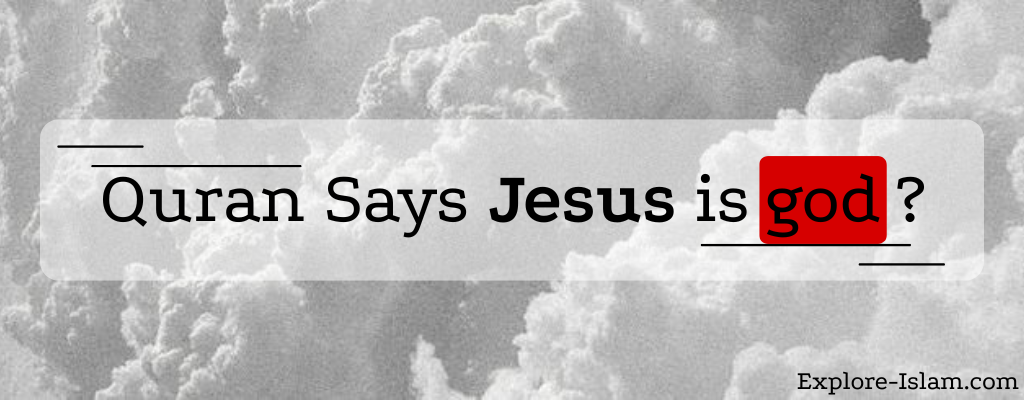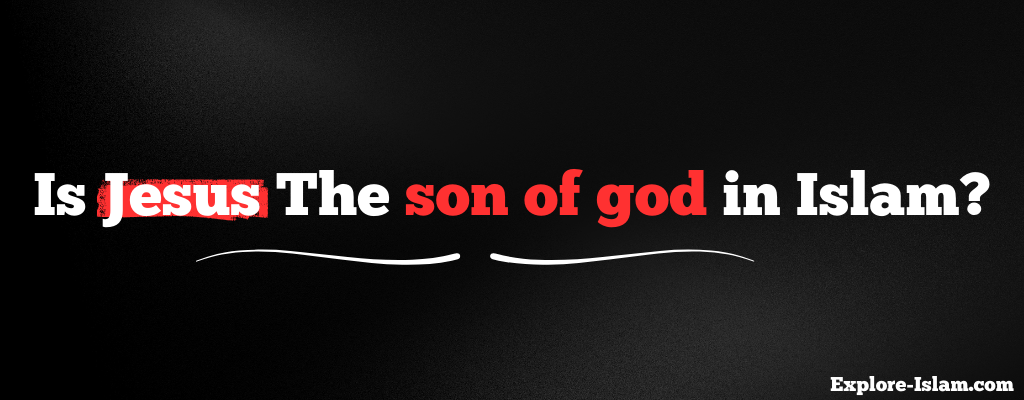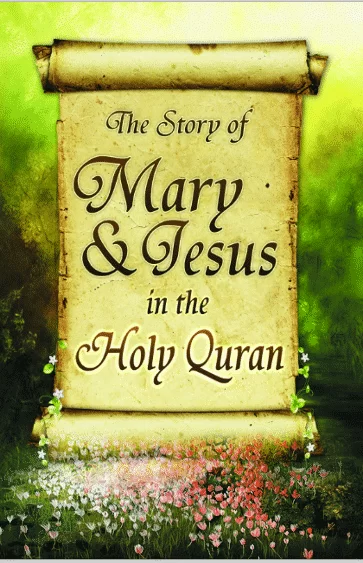If you ask whether the Quran says Jesus is God or not, then you are in the right place! The Quran highlights the high rank of Jesus as a highly elevated human Messenger and servant of God but never attributes divinity to him.
This article explores the attributes of divinity and the reasons behind Islam’s assertion of uni-personal monotheism and clear refusal of Jesus’ divinity, as highlighted by Quranic verses in context. Keep reading for more!
Does The Quran Say Jesus Is God?
No, the Quran is crystal clear regarding Jesus. It says that Jesus was a messenger and can never be divine in any way. Following are the Quranic verses highlighting the situation around Jesus (PBUH):
1. The Quran States That Ascribing Divinity To Jesus Is Disbelief:
Almighty God states in the Quran that it’s a disbelief to set divinity for Jesus:
“Those who say, “Allah is the Messiah, son of Mary,” have certainly fallen into disbelief. The Messiah ˹himself˺ said, “O Children of Israel! Worship Allah—my Lord and your Lord.” Whoever associates others with Allah ˹in worship˺ will surely be forbidden Paradise by Allah.”
2. The Quran Asserts Jesus To Be A Messenger And A Servant Of God:
Almighty God clearly states in the Quran Jesus’ servitude saying:
“He [Jesus] was only a servant We showed favor to and made as an example for the Children of Israel.”
Where In The Quran Does It Say Jesus Is God?
The Quran never states that Jesus is God. Rather, it confirms his prophecy and servitude to the Almighty One God. However, some descriptions of Prophet Jesus in the Quran must be understood according to the Quranic major principles of Almighty God’s Oneness, not according to human interpretations:
1. Meaning Of The Spirit Of God In The Quran
Jesus is described as “a Spirit ˹created by a command˺ from Him (God)” (رُوحٌۭ مِّنْهُ), emphasizing the unique way he was created. Allah caused Mary (peace be upon her) to conceive Jesus through His command and the intervention of the angel Gabriel.
Almighty God states the description of Jesus in the Quran saying:
O People of the Book! Do not go to extremes regarding your faith; say nothing about Allah except the truth. The Messiah, Jesus, son of Mary, was no more than a messenger of Allah and the fulfillment of His Word through Mary and a spirit ˹created by a command˺ from Him. So believe in Allah and His messengers and do not say, “Trinity.”
Note that the same verse warns of believing in trinity and asserts the belief in Almighty God and His Messengers including Jesus!
2. Meaning Of The Word Of God In The Quran
The Quran describes Jesus as the word created by the divine command “be”:
“˹Remember˺ when the angels said, ‘O Mary, indeed Allah gives you good tidings of a word from Him, whose name will be the Messiah, Jesus, the son of Mary”
The term “word” refers to Allah’s command of “Be,” which resulted in Jesus’ miraculous conception. This meaning is based on the other Quranic verse:
“It is not [befitting] for Allah to take a son; exalted is He! When He decrees an affair, He only says to it, ‘Be,’ and it is.”
Thus, by putting the Quranic verses in their context, one can easily understand the truth of Jesus in the Quran.
Why Is Jesus Not God In Islam And The Quran?
Divinity must be ascribed to the Only One God and cannot be shared with anyone else. Let’s explore more verses from the Quran that convince the mind and speak to the heart about the impossibility of Jesus’ divinity:
1. Jesus Never Called People To Worship Him
According to the Quran, Jesus never instructed people to worship him but directed them to worship God alone, not himself:
“I never told them anything except what You ordered me to say: “Worship Allah—my Lord and your Lord!”
This perspective aligns closely with many biblical passages where Jesus emphasizes his dependence on and submission to God. This also directs our attention to searching in the Bible for a verse where Jesus orders humanity to worship him as God. Indeed, there is no such verse in the whole Bible. This brings us to the final point: “If it is really important, it must be repeated.”.
2. God’s Descriptions in the Quran Don’t Meet Jesus
Divinity criteria in the Quran are met only by the Almighty One God. Following are the main verses describing Almighty God’s Attributes in the Quran:
A. Uni-personal God
Almighty God is mentioned in the Quran as a uni-personal God:
Say, ˹O Prophet,˺ “He is Allah—One ˹and Indivisible˺; Allah—the Sustainer ˹needed by all˺. He has never had offspring, nor was He born. And there is none comparable to Him.”
B. The Ever-Living God with divine Attributes beyond humans
Also, Almighty One God is described with high descriptions beyond any other one but Him:
Allah! There is no god ˹worthy of worship˺ except Him, the Ever-Living, All-Sustaining. Neither drowsiness nor sleep overtakes Him. To Him belongs whatever is in the heavens and whatever is on the earth. Who could possibly intercede with Him without His permission? He ˹fully˺ knows what is ahead of them and what is behind them, but no one can grasp any of His knowledge—except what He wills ˹to reveal˺.”
[2:255]
These attributes can’t be met by Prophet Jesus or any other human being.
3. Jesus’ Attributes Negate The Majesty Of Divinity
According to the Quran, it is strongly prohibited to describe God in any negative way or human resemblance, since God is perfect in all His attributes.
Have you ever asked yourself: Did God’s incarnation in human form negate God’s perfection? Read this verse and figure out the logic behind it:
“The Messiah, son of Mary, was no more than a messenger. ˹Many˺ messengers had ˹come and˺ gone before him. His mother was a woman of truth. They both ate food. See how We make the signs clear to them, yet see how they are deluded ˹from the truth˺!”
What is the value of describing Jesus and his mother as “they both ate food”? In a very intelligent way, the Quran directs us to the huge problem behind claiming that God became a human being. Human beings are needy. They eat food, and anyone who eats food needs to go to the toilet afterward. Do such descriptions befit God, the Lord of the heavens and earth?
Similarly, we can ask: Can God, the All-Powerful, allow a group of wicked Jews to catch Him, spit in His face, place thorns on His head, and finally kill Him in a shameful way?!
4. Jesus Doesn’t Know The Time Of Judgment Day
The Quran states that only the Almighty One God has absolute knowledge, and restricts the knowledge of the coming of the day of Judgment to Almighty God only:
“And Blessed is the One to Whom belongs the kingdom of the heavens and the earth and everything in between! With Him ˹alone˺ is the knowledge of the Hour. And to Him you will ˹all˺ be returned.”
The verse is in the context of replying to those who claim God has a son. Here, the Quran refers to Matthew 24:36, in which Jesus confesses that his knowledge is limited.
Conclusion
To conclude, the Quran never says Jesus is God or the son of God. Instead, the Quran asserts the following:
- The principle of uni-personal monotheism is highlighted in many Quranic verses.
- Attributes of divinity mentioned in the Quran apply only to Almighty One God and not to Jesus.
- The Quran states that Jesus is a human Messenger and a servant of Almighty One God with human attributes contradicting divinity, such as eating food.
- Descriptions of spirit and the word of God are highlighted in their Quranic context as the divine order of creating Jesus, and the meaning is supported by the Quran’s warning against the Trinity in the same context.
Curious to know more about Jesus in the Quran, start a conversation now for more discussion!











